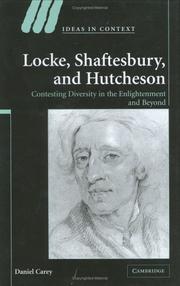| Listing 1 - 1 of 1 |
Sort by
|

ISBN: 9780521845021 0521845025 9780511490453 9780521117463 0511137214 9780511137211 0511135041 9780511135040 0511490453 1107152046 9781107152045 1280422157 9781280422157 0511183488 9780511183485 0511201435 9780511201431 0511311656 9780511311659 0521117461 Year: 2006 Volume: 74 Publisher: Cambridge, UK ; New York : Cambridge University Press,
Abstract | Keywords | Export | Availability | Bookmark
 Loading...
Loading...Choose an application
- Reference Manager
- EndNote
- RefWorks (Direct export to RefWorks)
Daniel Carey examines afresh the fundamental debate within the Enlightenment about human diversity. Three central figures - Locke, Shaftesbury, and Hutcheson - questioned whether human nature was fragmented by diverse and incommensurable customs and beliefs or unified by shared moral and religious principles. Locke's critique of innate ideas initiated the argument, claiming that no consensus existed in the world about morality or God's existence. Testimony of human difference established this point. His position was disputed by the third Earl of Shaftesbury who reinstated a Stoic account of mankind as inspired by common ethical convictions and an impulse toward the divine. Hutcheson attempted a difficult synthesis of these two opposing figures, respecting Locke's critique while articulating a moral sense that structured human nature. Daniel Carey concludes with an investigation of the relationship between these arguments and contemporary theories, and shows that current conflicting positions reflect long-standing differences that first emerged during the Enlightenment.
General ethics --- Locke, John --- Hutcheson, Francis --- Shaftesbury, of, Anthony A.C. --- Benefices [Ecclesiastical] --- Beneficies [Kerkelijke ] --- Bénéfices ecclésiastiques --- Church benefices --- Enlightenment --- Graces [Expectative] --- Lumières (Philosophie) --- Lumières [Siècle des ] --- Pluralism (Benefices) --- Siècle des Lumières --- Verlichting (Filosofie) --- Enlightenment. --- Pluralism. --- Locke, John, --- Shaftesbury, Anthony Ashley Cooper, --- Hutcheson, Francis, --- Pluralism --- Monadology --- Monism --- Philosophy --- Reality --- Aufklärung --- Eighteenth century --- Philosophy, Modern --- Rationalism --- Anthony, --- Cooper, Anthony Ashley, --- Shaftsbury, Anthony Ashley Cooper, --- Sheftsberi, Ėntoni Ėshli Kuper, --- Shaftesbury, Anthony Ashley Cooper --- Philanthropus, --- Lokk, Dzhon, --- Lūk, Jūn, --- Lo-kʻo, --- Locke, Giovanni, --- Lock, --- Lock, John, --- Rokku, Jon, --- לוק, י׳ון, --- Arts and Humanities --- History
| Listing 1 - 1 of 1 |
Sort by
|

 Search
Search Feedback
Feedback About UniCat
About UniCat  Help
Help News
News